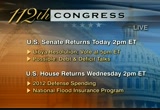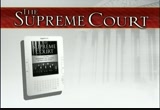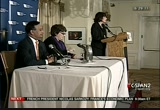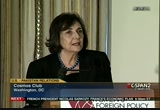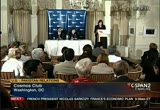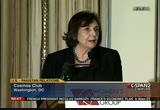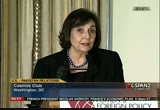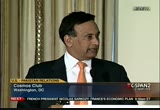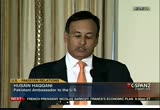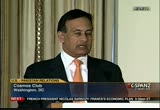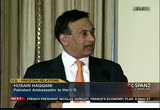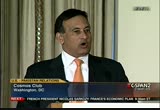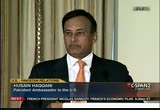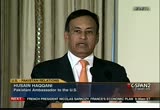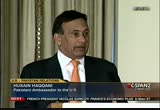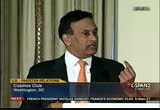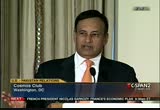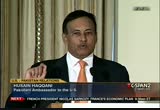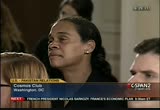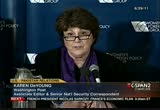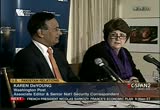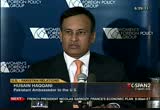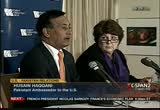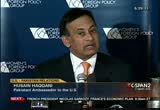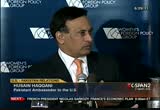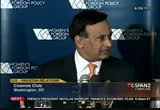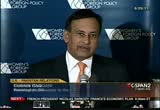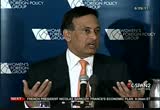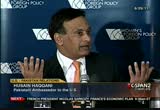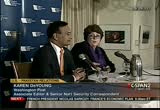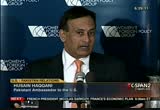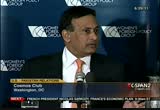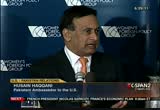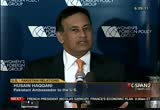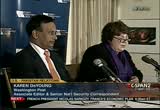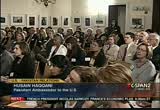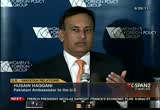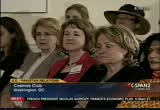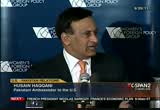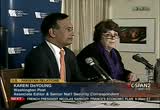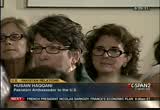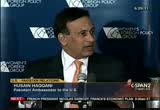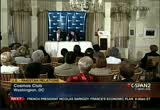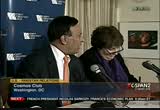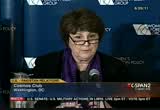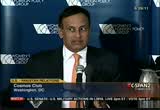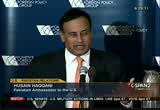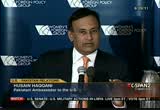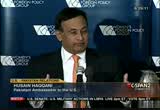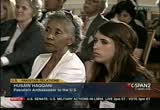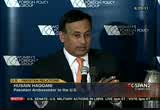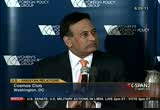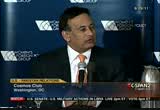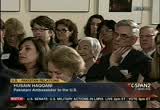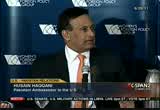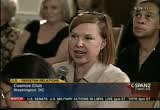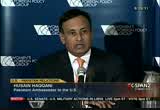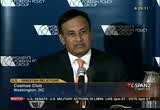tv Today in Washington CSPAN July 5, 2011 8:00am-9:00am EDT
8:00 am
8:01 am
>> c-span has launched a new, easy to navigate web site for politics and the 2012 presidential race. with bio information on the candidates, twitter feeds and facebook updates from candidates and political reporters and links to c-span media partners in the early primary and caucus states. visit us at c-span.org/campaign 2012. >> the supreme court is now available as a standard and enhanced e-book and tells the
8:02 am
story of the court through the eyes of the justices themselves. p eleven original c-span interviews with current and retired justices, it includes an interview with elena kagan and with the enhanced e-book, watch multimedia clips from all the justices. c-span's the supreme court, available now wherever e-books are sold. >> now, a conversation with pakistani ambassador to the u.s., husain haqqani. the conversation is moderated by washington post's senior national security correspondent karen deyoung. the women's foreign policy group in washington, d.c. hosts this hour, 20 minute event. >> good evening, everyone. and welcome. [inaudible conversations]
8:03 am
>> i'm going to start again, sorry. okay. good evening, everyone, and welcome. i'm patricia ellis, president of the women's foreign policy group. we promote women's leadership and women's voices on pressing international issues of the day such as our topic for tonight, u.s./pakistan relations. on behalf of the wefpg and our board members who are present tonight, dawn, gayle, donna and teresa, i want to welcome everybody here. we're so glad that you could join us for this behind-the-headlines event. these are events on hot issues in the news, and recently we've done events on egypt, libya, women in the middle east, um, and our event tonight is with
8:04 am
ambassador husain haqqani, the pakistani ambassador to the who will be joined by our friend and frequent speaker and moderator, washington post's senior national security correspondent karen deyoung. for a conversation on u.s./pakistan relations. the event could not be more timely, as we all know, given the increased tensions in the relationship between the two countries following the killing of osama bin laden. we're so pleased to have the ambassador with us tonight to explore the complexities and the importance of this relationship and extremely lucky to have karen back. i want to recognize a few guests who are here with us tonight, undersecretary of state for public diplomacy judith mchale. [applause] um, principle deputy assistant
8:05 am
secretary for economic energy and business affairs, deborah mccarthy. [applause] um, members of our corporate advisory council and, of course, our many ambassadors and diplomatic colleagues who we work very closely with throughout the years on our embassy events. our next one is going to be in july at the embassy of zambia, and it will be african-american leaders promoting investment, trade and peace. we're hoping that many of you will be able to join us for this very special event. it now gives me great pleasure to welcome our speaker and moderator. you have their bios in your program book, so i am just going to give you the highlights and a few of their accomplishments. um, ambassador haqqani has represented pakistan in the
8:06 am
united states since 2008, um, and he appears regularly on television, um, and frequently publishes op-ed pieces. he was an adviser to prime minister benazir bhutto and is a journalist, author, professor and scholar. our moderator, karen deyoung, is associate editor and senior national security correspondent for the post, is also an author and has served in many senior positions in, um, at the post in washington and abroad and has covered pakistan and afghanistan extensively. so we're really lucky to have both of them tonight. after the ambassador's opening remarks, he and karen will have a conversation before opening it up to q&a with the audience.
8:07 am
so, please, join me in welcoming ambassador haqqani and karen deyoung. [applause] >> thank you very much. patricia, for that kind introduction. of course, when i was asked to come here, i thought, you know, nobody's paying any attention to pakistan these days. [laughter] nothing gets said about pakistan in the media, so why not use this forum to be able to communicate and, of course, find an excuse to be on c-span. [laughter] and so, therefore, here i am. it's a pleasure to see secretary mchale in the audience, judith mchale and i have worked together in the last sort of, you know, since her appointment as undersecretary, and public diplomacy, of course, is one of the many challenges we have dealt with at our end. so it's a pleasure seeing you
8:08 am
here, and thank you for all the help and cooperation you offered here. of the distinguished audience, many of whom i know personally for quite some time which just tells you how old i am, but i would also like to recognize my very able deputy, the embassy of pakistan is very lucky to have a woman as the second in command. hopefully, one of these days -- we have had two women ambassadors, we just probably are better schooled than most countries who send representatives abroad. so i'm very proud to have a very competent woman as my right hand at the embassy. let me just begin by saying that the united states and pakistan have been allies for a long time. pakistan and the united states actually signed a mutual defense agreement in 1959. we started an aid relationship going back to 1949 considering that pakistan got its independence in 1947. that's like really since
8:09 am
inception. and then we have had a two-tiered relationship since 1954 when pakistan joined the southeast asia treaty organization which was part of john foster dulles' sort of, you know, ring of treaties for containment of communism. so pakistan and the u.s. have been allies for a long time, but sometimes i feel like this is a couple that has been married for a very long time but still doesn't know each other. [laughter] and that is why we have periodic difficulties and differences. pakistan culturally is a society which values relationships and consistency in relationships. the united states has a rell tyly more -- relatively more functional approach, especially in international relations. and that has been the real sore point here between the two. the americans always come and say, you know, let's do this together, and the pakistanis think, ah, this is the beginning of a relationship. and when that is done, the americans say, fine, now, you
8:10 am
know, we've got other things to do. and the pakistanis feel this is very disturbing, this is a disturbing trend, the americans are not really our friends. then a few years later something else comes up, and the americans say, well, now we need to do this together. if there is going to be an american/pakistani partnership, it has to be a long-term strategic partnership. and it cannot just be transaction. there will always be transactions. there are transactions even in the closest of relationships, you know? i'm a father, and so i know, you know, you have transactions even with your kids. there's nothing wrong with transactions. but it can't be exclusively transactional. and to understand the context of why pakistan is, you know, newspapers sometimes describe pakistanis as quote-unquote paranoid and india-centric. no. we have a region where we will live long after the americans' security concern du jour has passed. we know that from fact.
8:11 am
we know it from the cold war. we were the country that provided the intelligence base from which france's gary powers took off for his mission over the soviet union and got shot down. only to have the soviet union threaten us with retaliation because he took off from a base in pakistan without there being any american commitment actually to be there to protect us against that retaliation if that occurred. those are pieces of history. americans are a great nation, and i've said this. you know that this is my little cliche, but i'm going to repeat it anyway because sometimes cliches are good. and that is that americans do a lot of things very well. america is a great nation which has contributed immensely to human progress, the idea of liberty, freedom, the idea of democracy, modern capitalism, globalization, everything. and then, of course, more than any other nation in this at least the last 200 years, all of
8:12 am
that is great. but there's one thing that americans don't do -- in fact, there's two things americans don't do well. one is history. the american attitude is, you know, joe? he's history. [laughter] or as henry ford said once, you know, all history's bunk, you know? that's the attitude. it's for kids who go to college and study. one young man introduced himself as a history major, and i said when i was teaching for this cup the problem was finding enough kids who wanted a history major. not understanding history. and the second part more thans don't do well -- americans don't do well is patience. and we in our part of the world, history is most important. so there's a historic context both to our relationship and to our relationship with our neighbors. and because of that we find ourselves in a position where we have never been fully able to or at least some parts of our government have never been able to fully trust their
8:13 am
counterparts in the u.s. government and vice versa. and now we have a situation where we have a war that we need to fight and win for our people's sake which is the war against terrorists. terrorists have killed more pakistanis in the last several years than citizens of any other nation. 30,000 people have died in pakistan because of terrorist actions, and that includes benazir bhutto a very dear personal friend of many of us in government, including myself. and a respected leader for us. and we are the only country that has actually lost military officers of the rank of general in this effort. that said, we do have a complicated reality in our region and, therefore, that complicated reality sometimes does not always intersect positively with american policy in our region and causes problems. so if americans want it done yesterday, pakistanis say let's do it quietly and patiently.
8:14 am
americans do it their way, pakistanis do not agree with the way americans want to do it, and the headline is pakistan/u.s. relationship under brink of breakdown again. let me just say that this relationship is under stress, but it is not on the brink. because both sides also realize the value of each other to each other. the pack 1257bnys realize -- pakistanis realize how important the u.s. is to pakistan, and the u.s. realizes how important pakistan is to the u.s. if there is to be a stable afghanistan, that stable afghanistan requires pakistan's critical participation in any reconciliation process in if afghanistan. at the same time, the defeat of al-qaeda and all terrorist groups affiliated with al-qaeda also requires pakistan to be able to defeat them at home for our own sake. we don't need to do it just for you, but we need to do it for ourselves. it's not easy simply because these people have support
8:15 am
networks as has been said by many american officials. osama bin laden was found in pakistan. there's no evidence that anybody in the pakistani government had anything to do with his presence there, but obviously he had people in pakistan who supported him. 180 million people in pakistan, most of them -- the country overwhelmingly muslim. a lot of them share views and ideologies and belief systems that make them sympathetic to radical groups, and that is where the effort of trying to change the whole discourse of pakistan, changing the whole milieu, the environment, the economy, the education system has been very important. and that cannot be done in a transactional manner. you can't say we'll give you $2 billion, change everyone's mind and make them all stop thinking that the restoration is the best course for muslims of the world today. with those kinds of numbers, if
8:16 am
1% of the population is sympathetic to a view, a radical view for islamic revival and resurgence, we're talking about 1.8 million people. that's a lot of people. it's not a small number. and amongst them can there be people who can actually create networks and they can work and actually provide a private safe haven, a private sanctuary very cleverly designed and protected for somebody like bin laden? absolutely, they can. so what is important is to get other -- over the moment. and the good news is every new days when -- few days when i have spare time, i actually try to find some old, and i play this game with karen also who's one of the recipients of the e-mails of mine. what i do is e-mail stories that have appeared about the u.s./pakistan relationship that appeared like seven years ago. and i say, oh, by the way,
8:17 am
today's headline seven years ago, groundhog day. it's just -- the movie. [laughter] and it's that kind of quality. there are certain things that keep repeating. pakistanis, we have to go past this simplification that pakistanis simply cannot be trusted by the united states and that the united states is fickle when it comes to its relationship with pakistan. it's a difficult narrative to manage, and as i said earlier, it's an easy job. that's why i have it. [laughter] but we are working on it. it's not going to be easy, it's not going to happen overnight. patience is required. the important thing is that the two countries need each other, and we will continue to work at it past the headline du jour, past the crisis du jour and past the strategic moment --
8:18 am
strategic momentary thinking du jour. we have to understand pakistan is the only muslim majority nation with nuclear weapons strategically located at the crossroads of south asia, central asia and the middle east, has neighbors such as india and iran and china and afghanistan and, therefore, its strategic location cannot be wished away. nor can the complexities of its populace. 180 million people. there is no such thing as a pakistani monolith. 180 million people live anything a new democracy will have a lot of diversity. the good news, again, is we are working on our democracy, we have sustained it for three years. hopefully, we will be able to sustain it for the longer-term future. and as a democracy it will be easier for the united states to work together with pakistan. we are in the process of normalizing relations with the two neighbors we have had difficulties with in the past, afghanistan and india, and you see that is already happening.
8:19 am
and the third thing is we are also looking at and thinking about things differently. instead of sitting at the cross crossroads, we want to see the opportunities; transformation and transition is never easy. it's going to be difficult. it's going to take time. but we have the clarity of our vision and the intent is there to do it. i'm going to leave all the tough questions for karen to ask and for me to answer during the dialogue. thank you all for being here. [applause] >> well, you can all see ambassador haqqani is a very adealt speaker. [laughter] and he's had lots of opportunities in all kinds of forums. he's paired with jon stewart on the daily show, done charlie
8:20 am
road, he's done numerous talk shows, and he's incredibly adept at not answering questions. [laughter] but i'm going to try. >> i was waiting for a compliment. [laughter] >> that was a compliment. >> okay. >> that was a compliment. [laughter] you, you -- in the beginning of your remarks you talked about public diplomacy and what challenge it was for both our countries. you were quoted recently as talking about remarks you made at pakistan's national defense university where you asked your audience, um, who pakistan's enemy was. you asked them how many of them thought that al-qaeda was the enemy, and not too many raised their hands. you asked them whether india was the enemy, and not too many raised their hands, a few more. and then you asked them if the united states was the enemy, and that's where you got most of the hands raised. that is something in this country just find in explicable,
8:21 am
just can't understand. they say, my gosh, we've given pakistan $20 billion over the past eight or nine years and, granted, that's kind of a pittance compared to what has gone into afghanistan and some other places, but it's certainly more than in the past. can you just explain to us why is it that pakistanis don't like this country? >> first of all, let me begingy correcting the narrative -- begin by correcting the narrative at what happened at the university. eventually, the national defense university put a video on their web site in ace lam brad, and you can -- islamabad and, actually, you can see it wasn't -- those who taught, and this was a mixed audience of civilians and military, so it wasn't just the military officers there, we should be very clear about that. but those who taught that al-qaeda was the major threat and those who thought the united states was a major threat were more or less equal in number. there were less people concerned about india.
8:22 am
so that's the, that's the correct, factual position. it was just after the abbotbad incident in which osama bin laden was taken out, and the feeling in pakistan was the had violated afghanistan's sovereignty in doing that, the u.s. could have done the same with pakistan's cooperation. so that was the divide within pakistan that was reflect inside that. it's not just a very -- a simplistic analysis of it would be, you know, it's more nuanced. even those people who didn't mind osama bin laden being taken out, they thought the u.s. shouldn't have done it unilaterally. it's like, you know, i have a problem in my backyard, but you can ring the doorbell and ask me to clean it up. there will be two different reactions to those two different things. as far as why is the united states not popular in pakistan
8:23 am
or not liked, let me just say that pakistan is not very well liked in the united states either right now. and that always has to do with how perceptions are being managed or are being stated. if you, if news daily is that pakistan is the source of trouble for american forces in afghanistan, that without the detail of what the context is if it is said that, you know, the u.s. asked pakistan to do x, y, z and pakistan refused, etc., the ordinary guy in mobile is not really an expert on foreign policy. although there are those who would argue there aren't many experts inside the beltway either -- [laughter] but the poor guy in mobile, alabama, is catching that 30-second sound bite on radio as he's driving home from his job, and he hears something negative about pakistan, that's how his
8:24 am
perception is being created. in pakistan the reverse is happening. and the u.s. made a huge mistake several years ago when you shut down your united states information agency which was a huge public diplomacy operation which, basically, was about explaining america to people. now your attitude is we give you money, now you should like us. with all due respect, how many of you have is actually fallen for that one in your private lives? ex-spouses collect alimony, and they still don't like the former husband. [laughter] it's not the way the world works. so i can't understand why people can't understand that here's a country where the general feeling is that the americans came and asked us to help them create a massive military operation against the soviet union when the soviet union occupied afghanistan. it was called the major operation to stop soviet march towards the south, towards iran,
8:25 am
towards pakistan and towards the warmer waters. we helped. we created this huge, humongous operation of jihadi groups and organizations. now, the golden rule is you arm people, you disarm them at the end of the battle. it's always happened, you know? when you have conscription, you take the guns back from the conscripts. instead of doing that, you did exactly -- i know, anybody who's watched charlie wilson's war has seen the caricature version of that. i was here for the complex verse of it. -- version of it. i remember begging american, congressmen and senators, not to shut down the international military education and training program for pakistan. at least keep that so you will have pakistani military officers who have exposure to the united states. and they said they couldn't be bothered because the main concern which was the soviet presence in afghanistan was over. so the u.s. just walked away. pakistan has had to deal with the fallout. now, of course it wasn't managed very well, we con cede that.
8:26 am
there were leaders in pakistan. some military successors and many political leaders who didn't understand the complexity of it all and, basically, they just thought, well, all we need to do is divert these guys from afghanistan to other fronts and try and use them as instruments of influence. but the real problem lay in the fact that all of a sudden from having economic resources to train them, to equip them and having equipped them, there was nothing for them. and so all these guys turned on us. and so we had a problem since then. that's one of the reasons why people dislike the united states. the united states is fickle, walks away. doesn't care about what the outcome is for us. second reason is there is an overall sort of negativity towards the united states all over the muslim world. you have had a problem in telling your story throughout the muslim world. it's amazing if you watch al-jazeera arabic. i don't know how many people here do, but if you do, you know
8:27 am
what? it's sometimes even more sympathetic to israel because the israelis have an arabic-speaking spokesperson on al-jazeera all the time. they're able to tell their own story this their own words. there is no arabic-speaking american spokesperson, so the arabs don't get to hear the arab version. ditto for pakistan. and then you have these people in our media -- we freed our media all of a sudden, and now we have something like 38 24/7 news channels in different languages in pakistan. guess what the united states would be like with 38 fox news channels and msnbcs? [laughter] well, that's the reality you are dealing with there, except you didn't invest in it, so none of the channels are really on your side. and that is the reason why people don't like the united states in pakistan. you haven't told your story, you walked away from pakistan, and by and large there is this whole fallout of the perception,
8:28 am
management. secretary clinton went there, did some town hall meetings. guess what? the class went up. now, i mean, i won't overplay this from 11% approval rating it went up to 21%, maybe 10% gain. but, hey, trying to explain your position to people, if it was an election year in the united states and this was happening in iowa, you'd all make headlines out of it. you have to keep it sustained. and this is another problem you have. because you've painted pakistan as a hardship -- [inaudible] most american diplomats and it's not a family posting, so most american diplomats go there for one-year posting. three months of unpacking, six months of service, six months of packing again. your case is going unheard. i mean, sometimes i make a better case, if i may say so, for u.s./pakistan relations on pakistani television than your
8:29 am
entire government, and i am not paid half as well as most of the people in the u.s. government. [laughter] and i did answer that question in tremendous detail. >> you did. [laughter] you did. i think that one of the concerns, however, is that if, as you say, the pakistani government realizes it needs the united states just as the united states realizes it needs pakistan, that the belief here is that it's incumbent upon pakistani leaders sometimes to defend this relationship and that they don't see that happening, that it's not just up to the united states to say, hey, like us, um, but that pakistani leaders particularly in the military sometimes overtly act against a better relationship and that many of the stories that are in the pakistani media which you so rightly recognize are quite anti-american. that your own military sees it to its advantage, um, and to its
8:30 am
own benefit to, um, to portray this relationship as not good. >> karen, the important thing is that if, i mean, leaks in the media is an instrument that is used often by people who are losing the policy argument. let's be honest. i mean, that's one way to sabotage sort of, you know, the momentum. so if you've had that situation in pakistan, it's obviously those individuals within the government apparatus whether civilians or noncivilians who feel that the elected leadership is moving the country in a totally different direction from where they would want it. but the way to fight it would be together. so while i concede the point that maybe too much information may be in circulation in pakistan on u.s./pakistan relations, and you and i both know the details of sometimes what these stories are, you know? conspiracy theories are a very common thing in our part of the world. it's unfortunate, but, look,
8:31 am
let's be real. 48% of our -- first of all, we have a very young population. half of our population is under the age of 18. 48% of those below 18 don't go to school. so these guys it's very easy for somebody to come on television and tell some unusual story that sounds very plausible to them, you know? for example, we had a recent television show in which this guy was talking about some alleged satellite-based system that america has, and they have a fancy name for them, it's called haarp, i don't know what the heck that stands for. but allegedly, the u.s. has the ability from satellites to maneuver and manipulate and cause floods and earthquakes. i mean, it's absolute nonsense, with all due respect to whoever used it on television, although i don't have much respect for them. but they, um, they say it. they get away with it. and so i agree with you that
8:32 am
there is those elements who may not, who may be leaking stuff to the media for policy reasons. but if u.s. and pakistan work together on this, if the governments are clearly understanding of the thing and say we have to work together and we have to stick it out, we will be to overcome that. it's happened in other countries. it's not like pakistan is the first country that has been affected and influenced by conspiracy theories in a significant way. there are other countries where this happened. southeast asia, i was there as a young journalist, and the situation was not very different. there were a lot of conspiracy theories in circulation. americans got a concerted effort, got the government onboard, worked it out. it can be done. i was just answering why it hasn't happened, and my answer is because it hasn't received the kind of quality and consistent attention that it should have. after 9/11 the u.s. got, did a quick kind of shotgun marriage
8:33 am
with the unelected regime of general musharraf. neither the government of pakistan, nor the american leadership at that time considered it necessary to try and create any public support for sort of changing the environment for greater american presence, etc. and then things like, for example, the ray davis incident where this gentleman decided to play james bond in real life and kill two people in broad daylight in a pakistani city didn't help. i mean, the argument about do you expect the illiterate population in our villages and in our small towns to understand arguments about diplomatic immunity? the way they saw it, it was an ugly american who shot two pakistanis without provocation or reason. and then getting away with it. and so, and so those are the things that also have to be taken into account.
8:34 am
t not just always our -- it's not just always our fault. there's enough blame to go around. >> i am going to give you a compliment now which is i think that the best ambassadors in washington recognize the amount of attention that they actually have to devote to congress. you have to know a lot of people, you have to spend a lot of time with them. sometimes even more time than you spend with people in the administration. and i think that that's one of the things that you have done and one of the things you spend the most time on. what's your sense of what the feeling is in congress now? are you worried that there is going to be a real push to cut off, to circumscribe this relationship? obviously, the obama administration has gone out of its way, i think it's fair to say, and john brennan did it again today in a speech of saying, look, yes, this is a complicated relationship, we need each other, we're going to try really hard. this is going to work and lifting all of pakistan's accomplishments in
8:35 am
counterterrorism. how concerned are you and what effect would it actually have if congress stands up and starts complaining more actually to the point of imposing more restrictions on aid and threatening to cut it off? >> first of all, we don't want this relationship to be just about aid, so i think that when people start talking about threatening to cut off aid, et, etc., i tell them, you know what? let's just back off on this aid business, you know? it's not like sort of, it's not like we are hired help, and the aid is our renumeration. it's something we have worked together. we both agreed that's the way forward to try to strengthen our country's capabilities in fighting terrorism and having the social and economic base that will enable us to deny the terrorist recruiters more recruits for the future. so let's not just make it as, you know, aid is reward and then when there is some behavior that is unacceptable, aid is withdrawn. let's not talk like that. but that said, i'm concerned,
8:36 am
i'm concerned, and i fully understand, by the way, the concerns of congress also. i fully understand because they have to explain to a very complicated american audience which does not always understand the nuance of foreign policy. middle america's concerns are jobs, middle america's concerns are the economy, and in a situation like this a billion dollars, two billion dollars without realizing, by the way, that maybe the war in afghanistan is consuming $12 billion a month which is six times the annual assistance that is being spoken of in relation to pakistan. that doesn't always register. it's not rational, t just emotional, and the emotional thing is, you know, if osama bin laden was in pakistan, well, let's cut off assistance for pakistan because that's the only -- when you have a hammer, every problem is a nail, you know? so you're in congress, you've got the hammer of aid, and that's what you use.
8:37 am
the truth is, it hasn't worked in the past. cutting off aid -- the aid, we may be able to, you know, we would like it for the sake of being able to have that relationship. but cutting off aid as a weapon of influencing policy hasn't usually worked. that said, congress will, i'm quite sure, listen to your military leaders, listen to the administration. because after all, in the united states' history and as someone who admires america's founding principles, i do understand that there was a reason why the founding fathers and the authors of the american constitution led the conduct of foreign policy to be the jurisdiction, essentially, of the executive branch. because while the money has to be appropriated by congress, the actual conduct of foreign policy has to be done by the executive branch because they understand, they have people who understand
8:38 am
in detail. whereas elected officials and members of congress who make a lot of effort now in this day and age to go and try and understand their countries, their primary responsibility is, essentially, to their constituents. and so i'm -- we're in an ongoing dialogue with members of congress, many of whom have been very supportive. there are some who are asking tough questions, and i respect them for asking those tough questions. my wife is a member of parliament in pakistan and at hearings in pakistan she asks tough questions because that's what her voters voted her into office for. so i would like the congress to continue to ask tough questions both of your administration, and i'm here on behalf of pakistan to answer their tough questions. but i think that this is not something that is going to be worked out by, um, making those tough -- taking those tough questions a step farther and making them into threats. that's not what we should be doing. and i think the american administration's position is the
8:39 am
position that will bring pakistan and the united states into an equilibrium in which american goals and pakistan's positive goals will both be fulfilled. only together, not by going at each other. >> um, i want to switch subjects a little bit to afghanistan. this week you had the latest meeting of the core group of afghanistan, pakistan and the united states to talk about reconciliation issues. in afghanistan. um, can you talk a little bit about what pakistan's assessment is of that process now, not only the core group process, but reconciliation in general, reports of united states meetings with taliban officials? and, also, what pakistan can bring to the table. pakistan has talked frequently about needing to have a seat at the table. what do you bring to the table? the americans have said you need to, you need to, um, either
8:40 am
sever your relationship, for example, with the haqqani network or bring them into this, into this process. what can pakistan do in order to make this process work better? >> first of all, we support a reconciliation in afghanistan because we understand that wars, essentially, always end through some kind of reconciliation and talks anyway. so the reconciliation process in afghanistan has to be led by the afghans. it's their country. and to bring to an end the internal conflict in afghanistan that started after the departure of the soviets way back, '89 the soviets went, their clients in kabul continued to hold on until after 1992 there was the famous civil war which then brought the taliban to power. so we do not want in any way to intervene in the internal afghan process. it has to be an afghan-led
8:41 am
process. we are very closely in contact with the afghan leadership, president karzai has visited pakistan recently, our leaders have continuously engaged with the leadership in kabul and in afghanistan. and the united states, afghanistan and pakistan formed a core group in which we will then slowly engage others. why has afghanistan been so difficult? one minute for me to play professor haqqani instead of ambassador haqqani. history. when the soviets left, a lot of regional powers ended up adopting the different factions of the armed groups in afghanistan that had been created primarily to fight the soviet union. the americans went, created a vacuum. but some groups were adopted by iran, some by the russians and, subsequently, the central asian states, some by our eastern neighbor, india, and some by pakistan.
8:42 am
you ended up with having different groups having links with different regional actors and regional powers. and so any reconciliation in afghanistan has to be based on the concept that none of the regional powers will play a role in afghanistan in terms of trying to dictate the outcome of the reconciliation. what can pakistan do? pakistan is willing to facilitate in every way. we still have two and a half million refugees, afghan refugees in pakistan. the afghans in pakistan, as you know, we have the ethnic overlap. there are pashtuns in afghanistan, there are pashtuns in pakistan. we want the pakistani pashtuns who have tribal and ethnic links with their counterparts to understand that the pakistani pashtuns will continue to look toward islamabad, the afghan pashtuns should look towards kabul. but our intelligence services
8:43 am
links with various people within the pashtuns on both side of the border can be used to facilitate the reconciliation and peacemaking process in afghanistan. the u.s. has to make up its mind on what it wants to see as the end game in afghanistan. and once it has made up its mind, encouraged the afghan government to continue to take the lead role, we are there as facilitators. most important thing is that all three -- afghans, pakistanis and americans -- have to share all information, be trusting of each other, and nobody should try to, um, try to do something that creates new misgivings on the part of the others. if we are partners, we have to be full partners. and i think that a lot more is happening here, karen, and that doesn't mean you're going to write a story about that soon, but there are a lot more happening quietly and behind the
8:44 am
scenes, as it should. as it should. in all such processes, the quiet diplomacy that sets the stage for the events that will be seen by the world as the mark, as the beginning of the reconciliation process. i think those events are quietly taking place right now. i won't say that they're going to succeed tomorrow or the day after. but in all such things once the breakthrough comes, then the reconciliation moves much faster. right now we are in the preliminary stages. hopefully, we will move faster as and when we are all clear on agreed goals and start trusting each other a little more. >> i'm going to open the floor to questions now. and if you could -- do we have a microphone that we're going to bring around? is someone going to bring it around, or do we want people to go to the back? if you -- i'll call on you. if you could say who you are, and we'll let pat, who's got her
8:45 am
hand up there, ask the first, ask the first question. >> okay. [inaudible] okay, thank you. [inaudible] you said we have to get over the moment. i'm wondering if you could give us any -- two questions -- concrete steps that could be taken to improve the relationship. you talked about the value of more visits by senior officials, more consultation. what are some other things that could be done? and another issue this washington remits to one of your -- relates to one of your neighbors, that is china. and there seems to be some concern in conversations that pakistan is getting closer to its friend, china, and particularly in the nuclear arena. and i'm wondering if you could address that concern.
8:46 am
8:47 am
connection between china and the united states from 1969, when the first kissinger trip took place, in 1974, when the united states recognize the people's republic of china and the shanghai communiqué came about. so, it's one of those washington things, you know, something becomes a story. like the example, one candidate declares for six days, everybody is talking about that candidate and then something happens and that candidate story fizzled out. that's the way is. know, china and pakistan have been friends for a very long time. they have the historic outlook and, therefore, they understand the value of consistency. so whether our trade is up or down, whether military supplies up or down, et cetera, et cetera, the chinese have remained engaged with us and they have remained consistent friends and partners. and, therefore, slightly higher population rating, slightly up.
8:48 am
significantly higher pipe liddy rating in pakistan. they are seen always has friends compared to americans who are seen as particular friends. so i don't think, we never see the u.s. and china, pakistan relations with either u.s. or china as mutually exclusive. we do not see the u.s. and china -- they're both two great countries. they have their own strength, and we certainly don't think that china is interested in a cold war with the united states come and go in the united states so far is given us any they look upon china as a major rival. this is not the cold war. so china and pakistan continue to remain friends while we are building a relationship with the united states. and hopefully, outpost is to china will be of use to the united states, or the u.s. closest to china will be of use to us. i think that's the way we look at it. on the subject of concrete steps
8:49 am
that can actually improve the situation of the relationship between the countries, i think that we need to understand that when events like osama bin laden, there are always two sides to the argument. the americans are upset that osama bin laden was in pakistan, and i fully understand that. pakistanis are upset that the americans violated pakistani sovereignty. i think we can both understand each others' perspectives and move forward. on intelligence relations, on military to military relations again, i think both sides need to talk to each other directly. there are many things of which, we work things out. but when i read the morning paper, it seems things haven't been worked out. and in an environment of agitation, when the pakistani media is saying americans is saying this, american media
8:50 am
saying pakistan, then politicians on both sides say what's going on, takes things difficult. so i think for some time we should continue with what we're doing, which is painstakingly build a relationship back, put pieces together, sort of do the actual business of diplomacy. and keep the decibels low. because the decibels have really increase the last few months. it started with the raymond davis medic the american side said gosh, he had diplomatic immediate release him tomorrow. the pakistani said community is kind of, you know, we are not sure, the paperwork is not complete and furthermore he did kill two people. is somebody going to apologize that first, or is he going to be so subjected to some sort of process on return to the united states? was going to happen here? they we have the out of the box solution which is family and mr. davis on the u.s. increased
8:51 am
and the regiment under our laws and he was set free. but it would still be good if the american side holds up its marketing of investigating as to what happened, because that's always the way it happened even with development. if i was going to commit a crime god forbid in this country, at the same time i would also, my government would be expected to at least investigate and ask me a few questions even if i'm not allowed to be arrested or put into any sort of criminal judicial proceeding in this country. but from that point on its always been what i call diplomacy or not diplomacy, but relationship by shouting at each other. it's not going to work. it's not working for each one of us, so let's lower the decibels. let the professionals -- she has been a wonderful job with many countries, and working in difficult situations.
8:52 am
him on your political leaders, people like senator kerry, who is the chairman of the senate foreign relations committee. he has often been very good at troubleshooting. the central intelligence agency is in the process of a leadership change but they have been professional, they always have way to work out things. that's what their job is. out of the limelight. and the department of defense. they understand. if there's one thing the u.s. military understand it is the valley of having relationship with other militaries of the world. and i think we should let those processes take place, and bring the decibel and the anger on both sides down, and move forward. i think we can, and i'm quite certain we will.
8:53 am
>> my name is kimberly. i wonder, although this may not be very diplomatic, whether you think afghanistan is the equivalent of yugoslavia, and has no coherence? >> actually, it's been more or less a state in its present form for almost 700 years, which doesn't make it comparable to yugoslavia at all. in fact, there was enough going back quite a while in history. the problem of course is that we tend to sort of think of -- nations have different, they're different stages of the modernization and different stages of evolution of political institutions. and when i was teaching here in this country, in my years in exile, one of the things i used
8:54 am
to do was, i used to say to my students, my american students, i said don't think the world is divided between americans and -- they're people just want to live their life the way they want to live their lives. and so don't always think that afghanistan, which part of kansas is afghanistan like? it isn't. [laughter] and the second thing i used to tell everyone is that the of the vineyard to understand is america is a nation of problem solvers. it looks sort solutions. if this doesn't work, let's invent a new model, find a better way, you know? too many side effects, the fda pulls out the drug from the market, et cetera, et cetera. but that is not the function of global diplomacy and international relations. the world is not a problem for america to solve. the world is our reality for america to understand and live with. so some things you have to live
8:55 am
with, some things you can inflict a change. interact and look him historically the americans have always succeeded in influencing nations that interacted with, not the nation's, not interacted with. without argument. and i have to be very cautious in saying that. look at the difference between your influence on eastern europe within your interacted with, and north korea, iran and cuba, countries that you actually don't maintain diplomatic relations with. where were you most successful entrants a bring your values and making people understand your perspective? and even change their own conduct closer to yours. so i think afghanistan also over time will have the interaction, et cetera come instead of going with the agenda saying it's either or, break up or sort of become like, you know, if you can't be california, sort of at
8:56 am
least the, at least be like arkansas. inc., happen. -- ain't going to happen. >> ambassador haqqani, bring the philosophical back to the a day, national counters and advisor jean ping -- >> i was doing so well. >> sorry. john brennan today unveiled the white house new counterterrorism strategy two years in the making. and in it he spoke of the relationship of pakistan, and said he wished the pakistani people would be more honest with themselves about the fact that a lot of the terrorism in the world emanates from their territory. that was set in the context he described in a strategy where he said there will be operations such as the raid on the osama bin laden compound, again, and
8:57 am
that the u.s. would take other similar actions, i.e. drones, but he never said the work. so how do you think that's going to play on pakistan what you're talking about bringing the rhetoric down? and what do you think of the strategy? >> i haven't in all honesty examine the strategy and any comment on that will involve consultation between my embassy and obama. we will wait comment on the. i think that we to view we have made a significant contribution in fighting terrorism. we are a victim of terrorism. at the same time we understand that there is an internal dialogue that has to take place in pakistan as well, and it is taking place. it is taking place. if you read the pakistani press every day, both opinions are there. there's -- there are those who blame it on the back and there are those who say you know what,
8:58 am
it's not america, it's about problems in our country. this is about radical and extremist views in our society. there are those who say we have terrorists violence against religious minorities, and that certainly has nothing to do with international political issues. and so we need to wake up to that reality. the people who kill our religious minorities are christians, our hindus, then shia muslims, i mean, those people are also terrorists and they are linked to the same people are engaged in anti-american violence across the border, and certain similar violence inside pakistan. they are the same people who attack our army and our intelligence members and our government. so it is a dialogue that is taking place in pakistan. we are quite confident that the
8:59 am
united states and pakistan can work together, should work together. there is no need for unilateral action. in all honesty, what do you think would have happened if the president of the united states had called president a few hours before the tram 11 rate instead we know where osama bin laden is, we would like our operatives and your operatives to go after him together. if there was concern about them it is concerned about the information being leaked, the american side could have said we're not going to tell you where. we have to do it together. we will arrived in once we have arrived your guys and our guys can put a helicopter together and do it together but it could have happened. and the operations like the. mohamed was found in pakistan. all the others, the significant
165 Views
IN COLLECTIONS
CSPAN2 Television Archive
Television Archive  Television Archive News Search Service
Television Archive News Search Service 
Uploaded by TV Archive on

 Live Music Archive
Live Music Archive Librivox Free Audio
Librivox Free Audio Metropolitan Museum
Metropolitan Museum Cleveland Museum of Art
Cleveland Museum of Art Internet Arcade
Internet Arcade Console Living Room
Console Living Room Books to Borrow
Books to Borrow Open Library
Open Library TV News
TV News Understanding 9/11
Understanding 9/11
